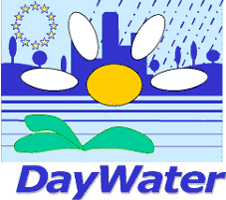 |
 |
 |
 |
 |
 |
Framework summary

Name of the Framework
DAYWATER
Brief description of the framework and tools within it
The aim of the DAYWATER project is to build a prototype of an Adaptive Decision Support System (ADSS) devoted to urban storm water source control. The ADSS is a combination of simulation models, assessment tools, databases, guidance documents, "road maps", leaflets, etc. It assists in the management of information needed to make decisions, but it does not embrace the decision making process in itself. The end user decides which components of the ADSS to use, depending on the actual context. The ADSS assists the identification of the most sustainable and cost-effective solutions for a range of urban situations.
Main components of the ADSS are:
• a Best Management Practices (BMPs) section: BMPs are structural measures used to store or treat urban stormwater runoff to reduce flooding, remove pollution, and provide other amenities. This section contains a comprehensive catalogue of the BMPs with information about design, performance, maintenance and operation, sources and loads...
• a pollutants section: it includes a "Chemical hazard identification and assessment tool" (with a methodology for assessing environmental risks to surface, ground and groundwater and a database of selected stormwater priority pollutants).
• a Multi Criteria (MC) Approach section: which proposes a MC tool allowing comparison between BMPs and/or scenarios
• a urban dynamics section: this part of the ADSS proposes a discussion of the aspects (context and system) of water management. The items discussed are moral, esthetical, local, economic, social, linguistic... ones based on case studies, and background.
• a modelling tools section which provides a prototype of a storm water sources and flux model for analysing water balances and pollutants loads.
• a library with case studies database, pollutants database...
• a checklist for site diagnosis...
Specific topic focussed on by framework
This framework deals with urban storm water management and strategies.
Web link
http://www.daywater.org/
How are the tools organised within the framework?
In order to adapt the ADSS to the specific user context, it is recommended to fill in a "user profile" and to make a selection of proposed key terms related to the project (phase, climate, scale? of the project). This is the most relevant part of the ADSS related to project issues. It is also possible during the use of the ADSS to put relevant information (tools, guidance document, case studies, database?) into a caddy, in order to improve its own framework.
Sector/s covered by framework
Waste |
Energy |
Water |
Transport |
Green/Blue |
Building & land use |
0 | 0 | M | 0 | 0 | 1 |
What language/s is the framework available in?
The DAYWATER ADSS is available in English.
What organisation developed the framework and in what country?
DAYWATER research project has been funded under the 5th framework programme of the European Community (contract n? EVK1-CT-2002-00111). It has been co-ordinated by Cereve at ENPC (Fr), and includes the following partners: Tauw BV (NL), Chalmers University of Technology (DK), Technical University of Denmark (Dk), Middlesex University (UK), National Technical University of Athens (GR), DHI hydroinform (CZ), Ingenieur gesellschaft Prof. Dr. Sieker MBH (D), Laboratoire Central des Ponts et Chauss饳 (Fr), and Luleaa University of Technology (SE).
Where is the framework available from?
http://www.daywater.org/
Co-ordinators of the project:
Daniel Th鶥not: 00 33 (0) 6 73 69 41 18
daywater@cereve.enpc.fr
and
Miriam F?ter: 00 33 (0) 6 73 69 41 72
foerster@cereve.enpc.fr
Centre d´Enseignement et de Recherche sur l"Eau, la Ville et l´Environnement (Cereve)
Ecole Nationale des Ponts et Chauss饳 (ENPC)
F-77455 Marne-La-Vallee Cedex 2 (France)
What are the strengths of the framework?
The strengths of the DAYWATER framework are:
? The comprehensive State-of-Art concerning storm water facilities, infrastructures and Best Management Practice?s (BMPs) at the European scale.
? The adaptability of the Decision Support System. The end-user decides which components of the ADSS to use, depending on the actual context, and the final decision making processes remains a political issue. Despite the large amount of information provided, the ADSS keeps user friendly.
? Effort of the combination of various tools to attain the decision. Several types of tools are linked together (like MC tool and BMPs database)
What other interesting information is available about the framework?
A username and a password are needed to enter the ADSS. For more information, please contact project co-ordinators: D.Thevenot or Miriam F?ter (see contact details above).
DAYWATER is one of six projects within the CityNet Cluster (http://citynet.unife.it/) which focuses on the aspects of integrated urban water management (water supply, sewerage, drainage) including their urban/rural interfaces (raw water sources, receiving waters, groundwater). The partnership consists of 60 research institutions and 56 end-users, thus comprising a significant part of the European R&D capacity and implementation potential in urban water systems.